 PHOTO: Mary van Balen PICASSO PLATE – GIFT FROM WOMAN ACTIVE IN THE FRENCH PEACE MOVEMENT The Scripture reading from Morning Prayer today (Proverbs 8. , 32-36) as well as the OT reading from Mass (Ws 7. 22b-8.1) speak of the importance of seeking Wisdom and Understanding: “Happy are those who keep my ways. Listen to instruction and grow wise…Happy the one who listens to me, attending daily at my gates, keeping watch at my doorstep.”
PHOTO: Mary van Balen PICASSO PLATE – GIFT FROM WOMAN ACTIVE IN THE FRENCH PEACE MOVEMENT The Scripture reading from Morning Prayer today (Proverbs 8. , 32-36) as well as the OT reading from Mass (Ws 7. 22b-8.1) speak of the importance of seeking Wisdom and Understanding: “Happy are those who keep my ways. Listen to instruction and grow wise…Happy the one who listens to me, attending daily at my gates, keeping watch at my doorstep.”
Opening oneself to Wisdom is a daily affair. The Holy One is always pouring out Divine Self, Wisdom, and we are called to “attend daily.”
The reading from Mass beautifully describes Wisdom in all her feminine glory. She is spirit, which means, as any reference to Spirit or to Holy One, that Wisdom/Spirit is neither male or female as we define gender. Spirit is beyond human gender. Of course, Christians are accustomed to hearing male pronouns when reading or speaking about God. Today’s reading from Wisdom is refreshingly filled with feminine pronouns – perhaps more noticeable to the women among us.
The author a long list of attributes. Here are a few for your reflection:
“For Wisdom is mobile beyond all motion and she penetrates and pervades all things by reason of her purity.”
“For she is an aura of the might of God and a pure effusion of the glory of the Almighty.”
“And she, who is one, can do all things and renews everything while herself perduring; And passing into holy souls from age to age, she produces friends of God and prophets.”
Wisdom is presented as a feminine face of God…as the Spirit who dwells in each of us.
Holy Wisdom, One worthy of our daily attention.
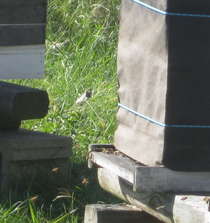
 PHOTO: Mary van Balen I took advantage of a day off to accomplish a number of things: doctor appointment, hair cut, and repotting plants. The day was too beautiful not to spend some of it outside and my hospitable friend, Melanie happily offered her time and her place. We have walked paths that wind across her property in every season. We have watched for comets and stars in dark hours of the morning. As I drove to her home, I felt my spirit become lighter anticipating a shared few hours.
PHOTO: Mary van Balen I took advantage of a day off to accomplish a number of things: doctor appointment, hair cut, and repotting plants. The day was too beautiful not to spend some of it outside and my hospitable friend, Melanie happily offered her time and her place. We have walked paths that wind across her property in every season. We have watched for comets and stars in dark hours of the morning. As I drove to her home, I felt my spirit become lighter anticipating a shared few hours.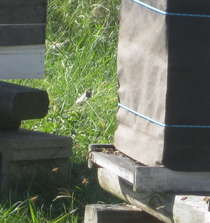 Melanie and I walked around the pond and circled by the bee hives. The man who cares for them had winterized them, but bees were busily flying in and out. In November. That seems late to me, but I am not a bee keeper. We watched for a while, and when after a simple lunch, when I left for my appointments, I stopped in the drive long enough to watch the bees again and take a few photos. Buzzing became louder, and when a bee landed on my hand, I decided the time had come to leave.
Melanie and I walked around the pond and circled by the bee hives. The man who cares for them had winterized them, but bees were busily flying in and out. In November. That seems late to me, but I am not a bee keeper. We watched for a while, and when after a simple lunch, when I left for my appointments, I stopped in the drive long enough to watch the bees again and take a few photos. Buzzing became louder, and when a bee landed on my hand, I decided the time had come to leave. From the Exultet:
From the Exultet: PHOTO: Mary van Balen The morning after Halloween, my mom’s large, silver mixing bowl filled with small candy bars sits on my table, tempting me. Why not have a bit of sweet to start the morning. I had feared this would happen. Being new to the neighborhood, I had no idea if trick or treaters would find their way to my door, so I prepared with a few bags of candy bars. When my neighbor appeared outside in the afternoon ready to take a walk, I asked her about Halloween “traffic.”
PHOTO: Mary van Balen The morning after Halloween, my mom’s large, silver mixing bowl filled with small candy bars sits on my table, tempting me. Why not have a bit of sweet to start the morning. I had feared this would happen. Being new to the neighborhood, I had no idea if trick or treaters would find their way to my door, so I prepared with a few bags of candy bars. When my neighbor appeared outside in the afternoon ready to take a walk, I asked her about Halloween “traffic.”  All Saints Day II by Kadinsky The short reading for today’s
All Saints Day II by Kadinsky The short reading for today’s 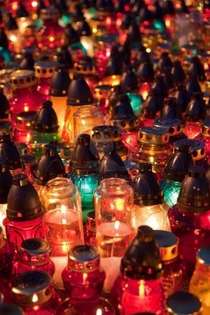

 All Souls Day, a day of prayer for those who have died but are not yet purified of the result of their sins, is commemorated on Nov. 2 in the Roman Catholic church. Those still waiting to be in the presence of God, the “beatific vision,” are those in need of prayer. In some countries, people visit cemeteries and decorate them with flowers and candles on Nov. 1 and 2.
All Souls Day, a day of prayer for those who have died but are not yet purified of the result of their sins, is commemorated on Nov. 2 in the Roman Catholic church. Those still waiting to be in the presence of God, the “beatific vision,” are those in need of prayer. In some countries, people visit cemeteries and decorate them with flowers and candles on Nov. 1 and 2. 
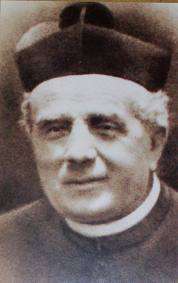
 Sr. Bonifacia You shall not wrong or oppress a resident alien, for you were aliens in the land of Egypt. You shall not abuse any widow or orphan. If you do abuse them, when they cry out to me, I will surely heed their cry; my wrath will burn, and I will kill you with the sword, and your wives shall become widows and your children orphans. If you lend money to my people, to the poor among you, you shall not deal with them as a creditor; you shall not exact interest from them. If you take your neighbor’s cloak in pawn, you shall restore it before the sun goes down; for it may be your neighbor’s only clothing to use as cover; in what else shall that person sleep? And if your neighbor cries out to me, I will listen, for I am compassionate. Ex 22. 21-27
Sr. Bonifacia You shall not wrong or oppress a resident alien, for you were aliens in the land of Egypt. You shall not abuse any widow or orphan. If you do abuse them, when they cry out to me, I will surely heed their cry; my wrath will burn, and I will kill you with the sword, and your wives shall become widows and your children orphans. If you lend money to my people, to the poor among you, you shall not deal with them as a creditor; you shall not exact interest from them. If you take your neighbor’s cloak in pawn, you shall restore it before the sun goes down; for it may be your neighbor’s only clothing to use as cover; in what else shall that person sleep? And if your neighbor cries out to me, I will listen, for I am compassionate. Ex 22. 21-27 Both these holy people gave their lives in service to the most vulnerable of God’s people. They were open to receive God’s love and to be God’s hands and heart on earth. They were Compassion.
Both these holy people gave their lives in service to the most vulnerable of God’s people. They were open to receive God’s love and to be God’s hands and heart on earth. They were Compassion.
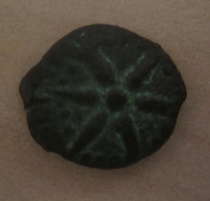
 WIDOW’S MITE PHOTO: Mary van Balen “Much will be required of the person entrusted with much, and still more will be demanded of the person entrusted with more.” Lk 12. 48
WIDOW’S MITE PHOTO: Mary van Balen “Much will be required of the person entrusted with much, and still more will be demanded of the person entrusted with more.” Lk 12. 48 How we share what dwells within, that is the point. We will never know what events or thoughts moved the widow to give away her last bit of money. What we do know is that somehow, it was a response to the God Grace that lived in her heart. She held the good of others above her own needs.
How we share what dwells within, that is the point. We will never know what events or thoughts moved the widow to give away her last bit of money. What we do know is that somehow, it was a response to the God Grace that lived in her heart. She held the good of others above her own needs.